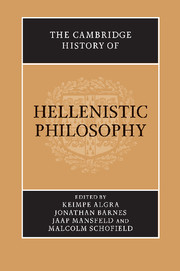Book contents
- Frontmatter
- PART I INTRODUCTION
- PART II LOGIC AND LANGUAGE
- PART III EPISTEMOLOGY
- 7 Introduction: the beginnings of Hellenistic epistemology
- 8 Epicurean epistemology
- 9 Stoic epistemology
- 10 Academic epistemology
- PART IV PHYSICS AND METAPHYSICS
- PART V ETHICS AND POLITICS
- Synopsis of principal events
- Editions of sources and fragments
- List of abbreviations
- Bibliography
- Index locorum
- General Index
- References
10 - Academic epistemology
from PART III - EPISTEMOLOGY
Published online by Cambridge University Press: 28 March 2008
- Frontmatter
- PART I INTRODUCTION
- PART II LOGIC AND LANGUAGE
- PART III EPISTEMOLOGY
- 7 Introduction: the beginnings of Hellenistic epistemology
- 8 Epicurean epistemology
- 9 Stoic epistemology
- 10 Academic epistemology
- PART IV PHYSICS AND METAPHYSICS
- PART V ETHICS AND POLITICS
- Synopsis of principal events
- Editions of sources and fragments
- List of abbreviations
- Bibliography
- Index locorum
- General Index
- References
Summary
Introduction
Early in the Hellenistic period the Academy went sceptic. Sceptic it remained until the two leading figures in the school at the beginning of the first century BC, Philo of Larissa and Antiochus of Ascalon, adopted more sanguine positions on the possibility of cognition – albeit mutually incompatible positions. The philosopher who effected this change of outlook in the Academy was Arcesilaus, scholarch from c. 265 BC until his death around twenty-five years later, and reputed as a dialectician whose employment of the Socratic method led him to suspend judgement about everything. He impressed the contemporary polymath Eratosthenes as one of the two leading philosophers of his time. And in his assaults on the Stoic theory of cognition he established the principal focus of argument between the Stoa and the Academy for the best part of the next two hundred years.
The most notable of Arcesilaus' sceptical successors was Carneades, the greatest philosopher of the second century BC. Although like Arcesilaus – and in similar emulation of Socrates – Carneades wrote nothing, his pupil Clitomachus published voluminous accounts of his arguments on issues across the whole range of philosophical inquiry; and it is principally to this source that – albeit indirectly – we owe our knowledge of a subtle system of thought. In the course of his engagement with both Stoicism and Epicureanism Carneades worked out for the first time in Greek philosophy an alternative non-foundationalist epistemology, sometimes misleadingly dubbed ‘probabilism’ in modern discussions of his views – although whether Arcesilaus or Carneades had any views of their own, or were simply dialecticians intent on undermining the positions of others, is a disputed question.
- Type
- Chapter
- Information
- The Cambridge History of Hellenistic Philosophy , pp. 323 - 352Publisher: Cambridge University PressPrint publication year: 1999
References
- 13
- Cited by

